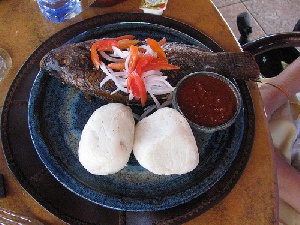A recent survey by Gallup indicates that a sizable number of people in various economic situations reported at times lacking money for food with the number in Ghana reported to be as high as 53%.
According to Gallup the current spike in global food prices is likely to affect substantial numbers of sub-Saharan Africans who were already struggling to afford food. A median of 57% of residents across 28 countries that Gallup surveyed in 2009 and 2010 said there were times in the past 12 months when they did not have enough money to buy the food that they or their families needed. This percentage for Ghana was 53%.
The results show a wide range in people's ability to afford food in this region, even before the Food and Agriculture Organization of the United Nations' food price index hit a record high in February. What's more, a median of 38% of sub-Saharan Africans in 2010 told Gallup they were "finding it very difficult to live on their present income," up from 31% in 2009.
Those who are finding it very difficult to live on their present income are the most likely to say there were times in the past year when they did not have enough money for food. That said, sizable minorities -- and in some cases large majorities -- of those who say they are "living comfortably" or "getting by" also say this. In Ghana as many as 68% of the population said they find it very difficult to live on their present income
The data in the Gallup survey showcase the widespread nature of the food insecurity challenge facing sub-Saharan Africa. While each country brings its own economic, political, and agricultural challenges to the equation, further increases in global food prices will be felt across the region and among those in various economic situations.
Certain groups region-wide are also more likely to at times lack money for food than others. While men and women struggle to afford food to similar degrees, those who are older or have more children younger than 15 living in their households are more likely to struggle than those who are younger or have fewer children. Additionally, those with less than nine years of education are more likely to struggle than those with more education.
Gallup's findings provide ground-level intelligence on the food security challenge facing sub-Saharan Africa, even before the most recent surge in global food prices. With the recent unrest in North Africa attributed in part to economic anxiety bubbling over, these data also point to areas of urgent concern in sub-Saharan Africa as people there feel increasingly unable to meet one of their most basic needs.
The fact that the world is facing a serious food crisis that will be more severe than the 2007-08 crisis has been reported since November 2009, one month before the NDC government reintroduced a 20% import tariff on basic foodstuff such as rice.
FSG has on many occasions reported that the step to reintroduce the import tariffs by the NDC government was not only insensitive to the plight of Ghanaians, but that it also caused serious distortions in the market and led to the creation of a 24.5% tariff differentiation between Ghana and the Ivory Coast. This in turn led to widespread smuggling of rice across Ghana’s Western borders and subsequent loss in millions of dollars revenue for the country.
The recent Gallup survey yet again clearly indicates that Ghanaians are indeed struggling while the government is in denial of this suffering. To date the government has not made any mention of a review of both long- and short-term policies to ensure food security in Ghana and to support the people of the country.
General News of Thursday, 7 April 2011
Source: peacefmonline

















